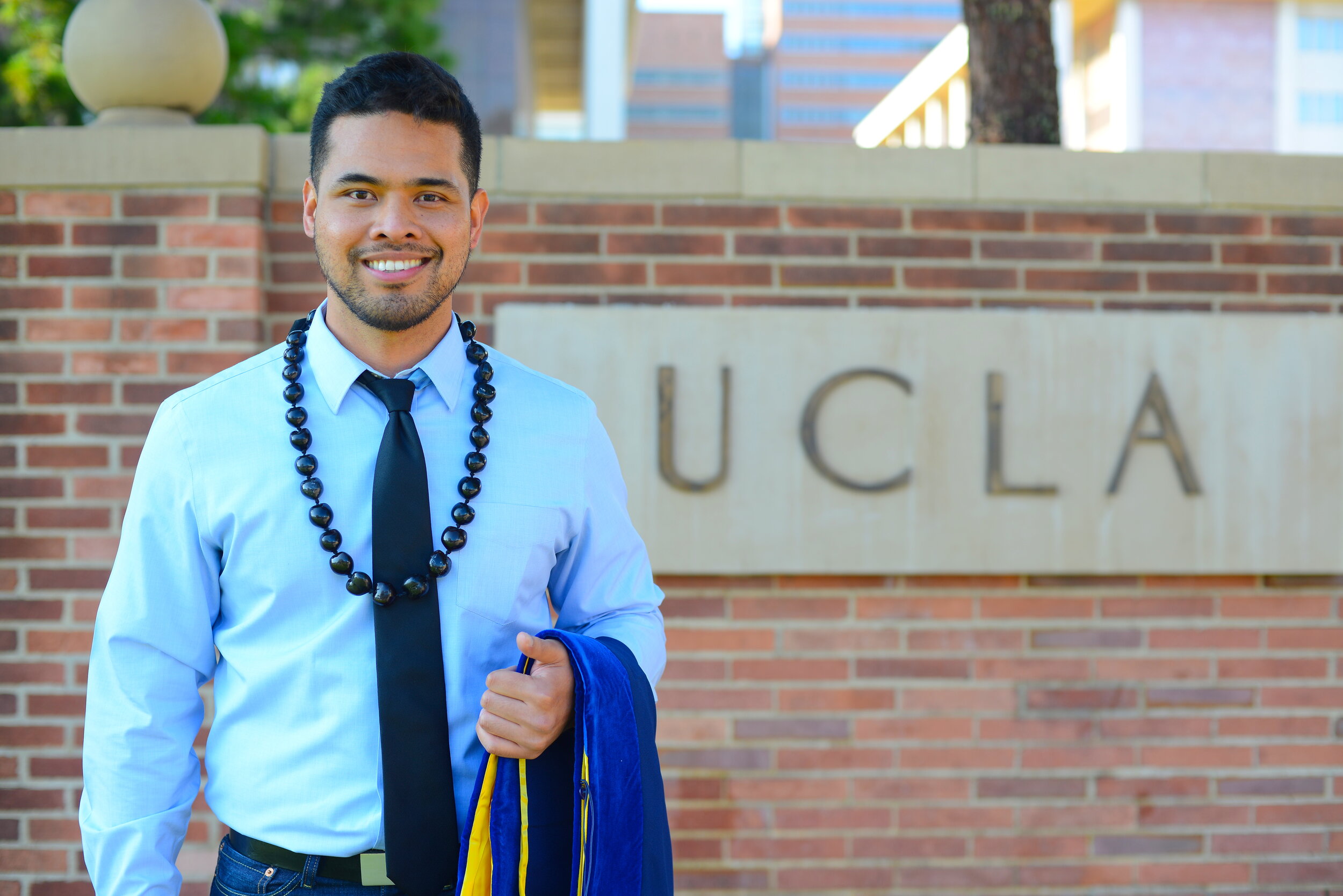Samoan Biochemist, Dr. Andrew Pati Ah Young | “Samoa had so much to offer a young, curious mind”
Andrew Ah Young shares tips on strategically applying to biomedical graduate programs and challenges Pacific scholars to embrace the unknown and pursue higher education abroad. He is currently a Research Scientist in the Bay Area, where he investigates the underlying causes of autoimmune diseases, such as rheumatoid arthritis, and develops new treatments. He hopes to see more Pacific scholars pursuing graduate degrees and careers in STEM.
Tell us about your background and experience applying to college.
I was born and raised in American Samoa. My father is from Western Samoa and my mother from American Samoa. My siblings and I grew up in the village of Faleniu, famous for our Men’s cricket team and our village’s 9pm curfew, a longstanding tradition very few villages practice today. After graduating from high school, I took a leap of faith and moved across the world (United States) to get a college education. As a teenager, I knew that my family did not afford to pay for college, so I applied for as many academic scholarships as I could. I must’ve applied to more than 15 colleges and scholarship programs. Fortunately, I not only received an academic scholarship to study Biology at the University of New Mexico, but I also got the Gates Millennium Scholarship, which paid for four years of undergraduate and an additional four years of graduate school. I went from worrying about how I would pay for school to not spending a penny on my education.
How did you decide to focus your career in the sciences?
My interest in Biology developed early on as a child growing up in Samoa. I was surrounded by brilliant traditional healers who used native plants as medicine to treat all kinds of ailments. Without any formal training in western medicine, these doctors healed patients with knowledge and skill passed down through oral tradition. I was intrigued by these unconventional methods of treatment and became more and more curious about the healing properties of plants and how the healers prepared different combinations and such. They were basically doing combination therapy in Samoa back in the day. Ha!
I explored these questions more deeply in high school. My science teacher, Dr. Joserose Jyothibhavan (or Dr. Rose) taught me the scientific methods and how to set up a controlled experiment. My first research project in high school was to test whether the extract from Samoan medicinal plants, prepared the traditional way, can kill mosquitoes. I compared some commonly used plants –for example, the nonu, fuefuesina, lau ti, and moegalo – for their ability to prevent mosquito eggs from hatching or stop mosquito larvae from becoming adults. I found so much joy in discovering new applications for these plants, and these early experiences set me on a journey to becoming a researcher.
In the summer after freshman year of high school, I traveled to the U.S. (San Diego) for the very first time to attend a summer research program at San Diego State University. It was my first time on a plane and leaving the comfort of family and Samoa. I was also traveling alone, so it was one of the scariest experiences in my life. It still gives me anxiety to this day when I think about those memories of navigating a major airport and interacting with foreigners in their language (English). I was very shy as a kid, so it took me some time to get used to people and a new culture, which was exciting and frightening at the same time. Nevertheless, the experience affirmed my passion for science research, and since then, I made it a goal to spend all my summers abroad working in various research laboratories.
How have your early life experiences prepared you for graduate school and your current career?
The culmination of these experiences taught me several things. First, I learned that maturity comes from putting yourself in new and often uncomfortable situations. Second, overcoming failure builds confidence and character. It’s totally normal to make mistakes or fail when you do something for the first time. Learn from it, and the next time around you’ll be the expert. Third, it is important build genuine and lasting relationships. Even now, I still reach out to old friends and mentors from high school and college for support, and vice versa. And finally, you really do reap what you sow. Do your job with the utmost integrity.
Learning these skills early in life helped me cope with the rigor of college and graduate school, which was often isolating and very depressing. Graduate studies in the biomedical sciences can be extremely brutal. You are basically tasked to discover something new that will fundamentally change, hopefully for the better, our understanding of biology and mankind. No pressure! To be honest, I sometimes wonder how made it out with my sanity intact.
Pasefika scholars are underrepresented in higher education around the world. When I was a Ph.D. student in the Biochemistry department at UCLA, there were no other Pasefika graduate students in STEM on campus. There were a few in other fields, and a handful in the undergraduate division, but still, we made up less than 0.5% of the student body at UCLA. But I think these statistics are slowly improving. And it helps that organizations like South Pacific Islanders are telling our stories to raise awareness and inspiration.
What are you doing now?
I recently completed my postdoctoral research at the biotech company, Genentech, where I studied the role of immune cells (neutrophils and mast cells) in inflammation. I am currently a research scientist at another company (Gilead) where I’m part of a team that is developing novel therapeutics for autoimmune diseases like rheumatoid arthritis.
I never thought that I would come or make it this far. There’s more I want to accomplish in life, but for the moment, I’m grateful to be doing something I absolutely love, to be financially independent, and to be able to support my family in ways I never could have if I had never left Samoa. I credit these achievements to the values of hard work and community that were taught by my family and teachers, and an upbringing in a Samoa that had so much to offer a young, curious mind.
What advice do you have for students pursuing scientific degrees?
Let’s get rid of stereotypes around scientific fields. We need to eliminate this idea that the sciences are too hard for our community. While I agree that STEM degrees can be difficult, just like anything, it requires patience and commitment. If you decide to pursue a career in STEM, stay focused, study hard, and don’t be afraid to ask for help. You’ll be surprised to see how many people are eager to support you.
Increase your chances of getting into college or graduate school by using your summers strategically. While I understand how tempting it may be to spend the summers doing nothing, if you have the opportunity, find a paid summer internship. This way, you learn a new skill and you get to travel to a new country, so it’s a productive summer vacation. Getting into graduate school is highly competitive these days, so the more you set yourself apart from other students, the better your chances are of getting in. Demonstrating that you have strong lab experience and are knowledgeable about a particular field are qualities that graduate programs look for. My CV for my graduate school application contained a list of all of the skills and experiences I acquired from the various internships I did in college and high school. It is never too early to start building your CV.
Graduate school in the sciences is free. As I’ve mentioned before, when you are considering a career in the STEM fields, remember that most graduate programs in the biomedical sciences are free. So, go get that PhD! Increasing our numbers in higher education can collectively uplift our South Pacific communities.
Don’t be afraid to leave the island. I have a lot of friends who never left Samoa for various reasons, and of these reasons is simply the fear of leaving home. I’ve found that the best thing you can do for your family is to invest in yourself by getting an education. It’s hard to see the value of a college degree at that particular moment in time, but I can guarantee you that pursuing a college education, whether it’s for two, four, or ten years, can open up new career opportunities and significantly increase your earning potential. I can now provide for my family in ways that I never could have if I had stayed on the island.
Embrace the unknown. I understand it can be scary to leave the island and do something you’ve never done before (like flying and getting lost in a busy airport), but it can also very exhilarating. Challenge yourself and embrace those moments. Experiencing a different part of the world helped me to appreciate the diversity the world has to offer, but also an opportunity for the world to see what Samoa can provide.
Want to give back to the Pacific community? We are 100% volunteer-led nonprofit. Help keep our programs stay free for our Pacific scholars.



